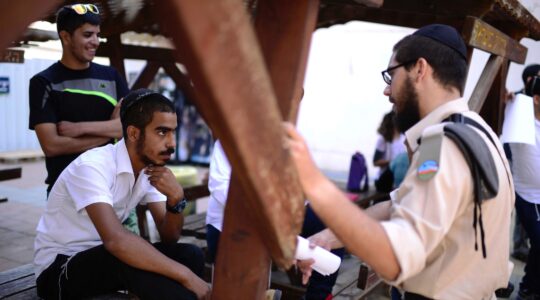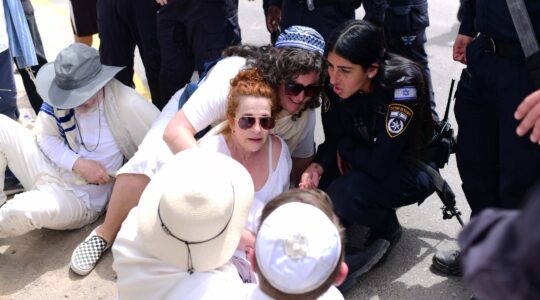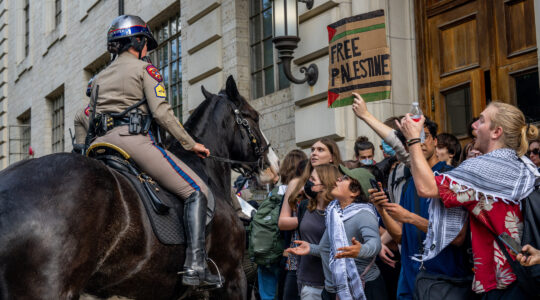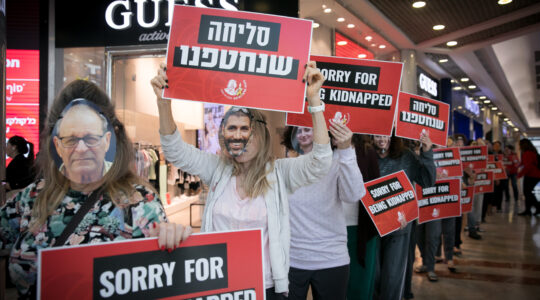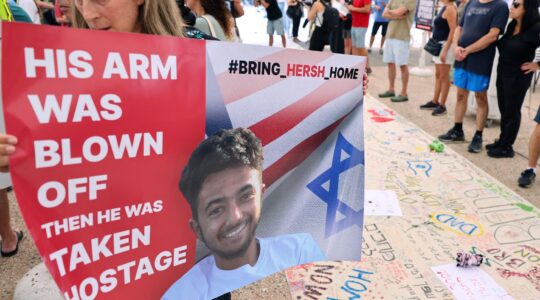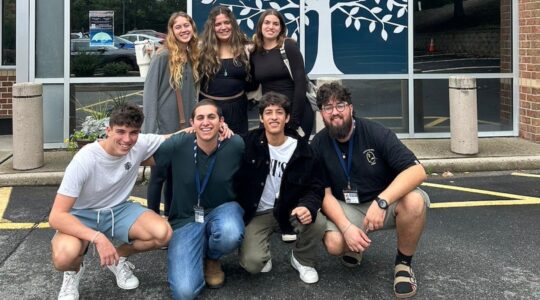ALEXANDRIA, Egypt, Dec. 18 (JTA) — It’s clear that the fewer than 100 Jews who remain in Egypt today are well integrated into society and that many consider themselves fully Egyptian.
Take Lina Mattatia, who has recorded births, marriages and deaths for the Jewish community in Alexandria for the past three decades.
“I was born here and it’s my country,” said Mattatia, 82, a petite woman who speaks in a delicate voice and shuffles across the floor in slow, careful steps.
After Mattatia married her second husband, a Jewish paper salesman, she had two servants to cook and clean for her. Today, a widow of more than 30 years, she stretches her modest income from the Jewish community to support not only herself but also a Muslim friend’s son, Karim, who has severe diabetes.
Karim’s mother, Amina, asked Mattatia to care for her son before she died from the same illness six years ago.
“She used to call me Mama Lina, and her son calls me Mama Lina,” said Mattatia, whose parents were from Greece. “I loved her like my daughter.”
The small community of Jews who came largely from Europe and the Middle East in various waves of immigration say they love Egypt, have many non-Jewish friends and consider this country their home.
Most community members in Alexandria and Cairo today are elderly women, many of whom are widowed or who intermarried long ago with Christian or Muslim men.
But it’s also clear there are some tensions that go along with being Jewish in an Arab country that has fought four major wars with Israel. Growing up Jewish in Egypt has not been a black-and-white experience, says an attractive elderly woman who gave her name only as Mrs. Bilboul.
There are very positive things about living in Egypt, such as being able to attend the Eliahou Hanabi synagogue in Alexandria to celebrate the Jewish holidays, Bilboul said.
“We could come every Saturday, but it’s much better to not go around and say I’m Jewish,” she said. “It’s much more clever not to mention it. But if someone asks me, I would never say I’m not.”
Earlier this year, while playing bridge, Bilboul — who is married to a Christian — was asked by a Muslim friend of at least four years whether she was Jewish. When Bilboul responded that she was, the surprised woman asked her in a friendly manner a series of questions, including how Bilboul prays and how she raised her children.
Bilboul told her she prays all day and raised her sons to be loving people, to have a respectful attitude toward everyone and to become children that she is very proud of today.
“She couldn’t say one word,” Bilboul said. Most of her friends know her religion and are “very respectful” of her, she adds.
The woman who had asked whether she was Jewish was young and perhaps had never met an Egyptian Jew. They are still on friendly terms.
But some in the community tread cautiously.
An elderly woman in the community asked an American visitor living in Israel to contact two of her friends there, also from Egypt, to tell them she was doing fine. She didn’t have an international phone line at home and thus would have to go to a telephone center and request to make the call to Israel through a clerk — something she wanted to avoid.
“With some people who are ignorant, when they hear the name of Israel, they think something else,” said the woman, who asked not to be identified. “Things are not running very smoothly with the situation in Israel. They’ll think that maybe I’m a spy.”
While Jews are well treated and secure in Egypt, one just has to be careful, she said.
Some choose not to discuss Israeli politics, but at least two community members said they have children living in Israel.
Albert Arie, a Jewish-born communist in Egypt, said he was against Israeli policy from the beginning but doesn’t think the Jewish state should be destroyed.
“I think it would have been better from the beginning if there was only one state for Jews and Arabs in Palestine,” said Arie, 76, who converted to Islam to marry a Muslim woman 40 years ago. “I hope and I think it will be like that after 50 years.”
There also are signs that the government is concerned about appearances.
An Egyptian Jew, who asked not to be identified, said he once was questioned by Egyptian officials after telling the media that the number of Jews left in the country can be counted on one hand. The officials advised him kindly not to make such statements, he said.
“The government wants people to think there are Jews here,” he said. They even have hope that one day there will indeed be Jews living in Egypt again, like in the past, he said.
Other Jews in Egypt also appear cautious about attention. The head of the Jewish community of Cairo, Carmen Weinstein, declined to be interviewed over Rosh HaShanah and instructed other worshipers in the synagogue not to talk as well.
But several Jews said they feel safe in Egypt.
Mattatia said she is very appreciative of the Egyptian security forces and the staff at the Eliahou Hanabi synagogue, where she works and prays.
Among the staff members is an Egyptian Muslim by the name of Abd El-Naby, who supervises nearly 20 maintenance and housekeeping workers who tend to the Alexandria synagogue and its properties. A jovial man of Nubian descent, El-Naby taught himself how to speak Hebrew through books and tapes so he could converse with visitors from Israel.
A fixture at the community’s headquarters for nearly 20 years, El-Naby almost seems part of the community.
“Look at all the people who are here. They are here to preserve us,” Mattatia said, gesturing toward the window in her office where several armed guards stood watch nearby. “They are here to protect us.”
Few Egpytian Jews left proud but cautious
Advertisement
